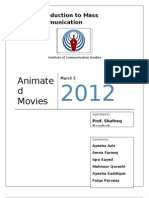0 ratings0% found this document useful (0 votes)
61 viewsHistory of Animation
History of Animation
Uploaded by
Dahlanz GhaniCopyright:
© All Rights Reserved
Available Formats
Download as PPTX, PDF, TXT or read online from Scribd
History of Animation
History of Animation
Uploaded by
Dahlanz Ghani0 ratings0% found this document useful (0 votes)
61 views33 pagesOriginal Title
History of Animation.ppt
Copyright
© © All Rights Reserved
Available Formats
PPTX, PDF, TXT or read online from Scribd
Share this document
Did you find this document useful?
Is this content inappropriate?
Copyright:
© All Rights Reserved
Available Formats
Download as PPTX, PDF, TXT or read online from Scribd
Download as pptx, pdf, or txt
0 ratings0% found this document useful (0 votes)
61 views33 pagesHistory of Animation
History of Animation
Uploaded by
Dahlanz GhaniCopyright:
© All Rights Reserved
Available Formats
Download as PPTX, PDF, TXT or read online from Scribd
Download as pptx, pdf, or txt
You are on page 1of 33
History of Animation
By: Alex Fink
1887
• H.W. Goodwin
invented nitrate
celluloid film, which is
made of gun cotton
and gun camphor.
1892
Emil Reynaud opened his
Theatre in Paris with a new
animation made by his
Praxinoscope. The
Praxinoscope was a Zoetrope
with mirrors placed on an
inside column that reflected out
the sequential drawings that
were on the inside of the drum.
He was able to project 80
frames without changing reels
and could project 10 to 15
minute "films". But the advent
of film drove him out of
business and in 1910 he threw
all his equipment into a river
and died in a sanatorium in
1918.
1894
Lois Lumiere invents the
cinematograph, a
combination
camera/projector/printer,
it was the first machine
to show movies
successfully on a
screen. This system
used a claw movement
and perforated film that
was synced to an
intermittent shutter
movement.
1909
Emil Cohl
combines live
action and
drawn
animation
together in his
film Clair De
Lune Espagnol.
1914
• John Bray opened his
studio and patented a lot
of the animation
process, but not the use
of cels. This is because
Earl Hurd had patented
the cel technique. So
Bray convinced Earl to
combine their patents
and they formed the
Bray-Hurd Process
Company.
• The US animation
industry was centered in
New York until the late
1920's and early 1930's.
1916
John Bray acquired more
patents and establishes a
patent monopoly for the
animation process. He tried to
enforce the patent by requiring
all animation studios using his
patented animation process to
buy a license and pay a fee.
Some studios paid it, some
ignored it, some of them found
a way around it, and some took
it to court. This issue caused
concern in the animation
business until the early 1930's.
Bray’s interest shifted from
entertainment films to
educational films.
1920
The most popular
character and series of
this time, Felix the Cat,
started on the Feline
Follies show from
Sullivan's studio. Otto
Messmer not only
created Felix, but he did
the stories and directing
on a schedule that made
one film every two
weeks.
1922
Disney's
first
animation
studio,
Laugh-O-
Gram Films
was built.
1923
Disney Laugh-O-Grams
Films studio goes
bankrupt. So Disney
moved to Los Angeles,
California and opened a
new studio in his uncle's
garage. Margaret Winkler
then put Disney under
contract for a series,
which he had proposed,
that combined live action
and animation, called
Alice Comedies. The
series featured a live
action girl with animated
characters.
1928
Disney did two Mickey Mouse
animations, Plane Crazy and
Galloping Gaucho without a
distributor. He was working on
the third animation, Steamboat
Willie, when motion picture
sound arrived. So he added
sound to the third Mickey with
the Powers sound system. It was
not the first sound film though,
Terry's Dinner Time was
released on Sept. 1st, but with
unsynced sound. Steamboat
Willie was the first sound
animated film with synced sound.
It made Mickey an international
star, and launched the Disney
studio of today. It also ushered in
the new age of sound for
animation.
1930
The Warner Bros.
Cartoons are born. The
First Warner Bros. short
was Sinking in the
Bathtub with the character
Bosko who was a take off
on Mickey Mouse. He
was a cousin of the
Warner Brothers and had
helped back the "Jazz
Singer". As a condition for
the studio each short
must contain a Warners
song. So Looney Tunes
began.
1931
•Warner Bros. makes
Merrie Melodies.
•Webb Smith, a
Disney animator,
starts the use of
storyboards, but
some people would
claim that the
storyboard was first
developed at the
Fleischer studios in
1930.
1932
Walt Disney wins
his first Academy
Award for
Flowers and
Trees. This was
the first
commercially
released film to
use 3 strip
Technicolor in
animation.
1935
•Hollywood
Production Code
comes into effect.
• Len Lye,
creates Color
Box, the first film
to be animated
by painting
directly on film.
1950
•Disney produced
Cinderella (return to
feature animation), and
Treasure Island, the first
live action feature and
they’re first TV special.
•Animation for TV
commercials becomes
an important part of the
animation industry.
1960
Hanna-Barbera
introduces The
Flintstones, the
first prime time
animated TV
series.
1961
Tetsuwan Atomu
(Astro Boy)
Japan's first
television
animation series
(Anime) begins. It
was created by
Osamu Tezuka.
1963
In computer
animation Ivan
Sutherland's
doctoral
dissertation
opens the way to
interactive
computer
animation.
1966
Walter Elias
Disney dies.
1971
First computer
animation used in a
feature film, The
Andromeda Strain,
as a special effect.
Special effect
animation during this
period played a
major role in the
amount of animation
produced.
1982
Tron, A Disney
feature has 15
minutes of computer
animation for 235
scenes at a cost of
$1,200 per second.
1987
The Simpsons
begins as spots
on the Tracey
Ullman Show.
David Silverman,
was one of the 2-
3 original
animators.
1988
Who Framed Roger
Rabbit was
released. Getting
over $300 million,
and it proved that
animation, at least
when combined with
live action, was not
limited to a
children's audience.
1989
Tin Toy wins the
Academy Award.
Directed by John
Lasseter and
produced by
Pixar it first
computer
animated film to
win.
1992
Cartoon
Network
broadcasts in 2
million homes,
and by 1995
it's in the 22
millions.
1994
•The Lion King,
One of Disney's
highest grossing
pictures to date
was released.
•DreamWorks
studio formed.
1995
Toy Story, the first
fully computer
animated feature
was released and
it took in more
money at the box
office than any
other film in
1995.
2002
Shrek from
Dreamworks
Studios Feature
animation won
the first ever
Oscar for
animated feature
they beat out
Pixar/Disney's
Monsters Inc.
2013
Elsa from the movie
frozen was made
with 420,000 CGI
threads, which was
20x more than the
threads used for
Rapunzel from
tangled. It required
the making of a new
program called
Tonic.
References
• http://animation.filmtv.ucla.edu/NewSite/WebPages/Histories.htm
• https://www.youtube.com/watch?v=Q3bbsDJWlXQ
• http://en.wikipedia.org/wiki/Film_stock
• http://www.pinterest.com/pin/529102656193938120/
• http://movie.douban.com/subject/4059057/
• http://automanga.sourceforge.net/Doc/node3.html
• http://my.smithmicro.com/tutorials/2360.html
• http://www.business2community.com/social-buzz/x-well-known-cats-worldcatday-0970104
• http://en.wikipedia.org/wiki/Laugh-O-Gram_Studio
• http://archives.frederatorblogs.com/refrederator/2006/07/20/turning-chicken/
• http://gifsoup.com/view/386773/steamboat-willie-ducky.html
• http://archives.frederatorblogs.com/refrederator/category/uncategorized/page/7/
• https://www.tumblr.com/search/merrie+melodies
• http://rebloggy.com/post/gif-tree-disney-shorts-dance-flowers-30s-1932-silly-symphonies-oscar-winner/435290027
09
• http://mycinderelladreams.tumblr.com/page/2
• http://www.pictureshowman.com/articles_genhist_censorship.cfm
• http://ficoforums.myfico.com/t5/media/v2/gallerypage/user-id/459194/image-id/2045i45CAD232D6243C3A
• http://giphy.com/gifs/4fWIFukyf7voY
• http://theworldofcomputingcomp1220uwi.weebly.com/ivan-sutherland.html
References Cont.
• http://www.biography.com/people/walt-disney-9275533
• http://www.imdb.com/title/tt0066769/
• http://www.imdb.com/title/tt0084827/
• http://weheartit.com/entry/37253425
• http://www.imdb.com/title/tt0096438/
• http://www.rankopedia.com/Best-Disney-Pixar-Production/CandidateData/19468/.htm
• http://rebloggy.com/post/adventure-time-cartoon-network-not-my-gif/38550362974
• http://www.socialphy.com/posts/images-pics/16740/The-Lion-King-Gifs.html
• http://en.wikipedia.org/wiki/Shrek_(character)
• http://www.comicvine.com/forums/battles-7/sub-zero-vs-elsa-1541881/
• http://lifeofkj.tumblr.com/post/50709673214/on-popularity-and-the-claw
You might also like
- The Evolution of CinemaDocument7 pagesThe Evolution of CinemaAndrei TufisNo ratings yet
- Our LineagesDocument250 pagesOur LineagesDawnette BrennerNo ratings yet
- Discipline and Ideas in Applied SciencesDocument21 pagesDiscipline and Ideas in Applied SciencesFranklyn TroncoNo ratings yet
- Animati On: Jemimah Keren S. DiamasDocument73 pagesAnimati On: Jemimah Keren S. DiamasjemkerenNo ratings yet
- Animosta - History DevelopmentDocument3 pagesAnimosta - History Developmentnurulnadiah94No ratings yet
- Animation 2Document73 pagesAnimation 2jemkeren100% (1)
- Jemimah Keren S. DiamasDocument73 pagesJemimah Keren S. DiamasjemkerenNo ratings yet
- The First Ever Animation: Los AngelesDocument7 pagesThe First Ever Animation: Los AngelesarcNo ratings yet
- Unit 12 1Document8 pagesUnit 12 1api-633973594No ratings yet
- History of AnimationDocument1 pageHistory of AnimationAnsel GordonNo ratings yet
- KKKKKDocument29 pagesKKKKKramkoNo ratings yet
- Presentation 3 1Document3 pagesPresentation 3 1api-532447284No ratings yet
- DisneyDocument2 pagesDisneyTracy ChatelierNo ratings yet
- History of AnimationDocument58 pagesHistory of AnimationMubarak RedwanNo ratings yet
- ResearchDocument22 pagesResearchapi-633973594No ratings yet
- Animated MoviesDocument17 pagesAnimated Moviesasad9058No ratings yet
- A Very Short History of AnimationDocument44 pagesA Very Short History of AnimationShahzad NaeemNo ratings yet
- Reel World of AnimationDocument32 pagesReel World of AnimationJim AñonuevoNo ratings yet
- History of Animatio1Document6 pagesHistory of Animatio1api-273857174No ratings yet
- FilmmakingDocument8 pagesFilmmakingPierina Morote CalderonNo ratings yet
- TimelineDocument24 pagesTimelineapi-265729793No ratings yet
- TimelineDocument15 pagesTimelineapi-295895310No ratings yet
- Group10 ReportDocument85 pagesGroup10 ReportKristine CaagbayNo ratings yet
- Wug15 Cinema PDF FinalDocument16 pagesWug15 Cinema PDF FinalJanardhan Juvvigunta JJNo ratings yet
- Timeline AnimationDocument2 pagesTimeline AnimationEusoffe UzihanNo ratings yet
- The Emergence of Feature FilmsDocument4 pagesThe Emergence of Feature Filmsudhayzzz7199No ratings yet
- A Brief History of FilmDocument52 pagesA Brief History of FilmAnand100% (2)
- Etymology : Before CinematographyDocument5 pagesEtymology : Before CinematographyNaditaNo ratings yet
- 2. History of AnimationDocument9 pages2. History of Animationsidharthm464No ratings yet
- ScripitDocument3 pagesScripitapi-477577030No ratings yet
- Tom and JeerryDocument43 pagesTom and Jeerryrasagna sarangaNo ratings yet
- History of AnimationDocument33 pagesHistory of AnimationEnaANo ratings yet
- 2nd Module - Class 7Document15 pages2nd Module - Class 7josephsebastian6812No ratings yet
- History of AnimationDocument26 pagesHistory of AnimationJohn Oliver Jamang100% (2)
- What is Animation - Pt4Document5 pagesWhat is Animation - Pt4Garland HolderNo ratings yet
- History of AnimationDocument4 pagesHistory of AnimationClaro P. TulaganNo ratings yet
- Starting PageDocument7 pagesStarting Pageapi-247822766No ratings yet
- Presentation 3Document13 pagesPresentation 3browngenesis470No ratings yet
- Animation: Prepared By: Haval AkrawiDocument30 pagesAnimation: Prepared By: Haval AkrawiMuhammad Yusif AbdulrahmanNo ratings yet
- Animation: Prepared By: Haval AkrawiDocument30 pagesAnimation: Prepared By: Haval AkrawiMuhammad Yusif AbdulrahmanNo ratings yet
- History of AnimationDocument26 pagesHistory of AnimationScribblingsofachildNo ratings yet
- Brief History of FilmDocument19 pagesBrief History of Filmaqsa asifNo ratings yet
- Week 005 AnimationDocument15 pagesWeek 005 AnimationMathew FernandoNo ratings yet
- عرض تقديمي مرح ملون مجرد نمط وأشكال صورة مخفية لعبة - 20231014 - 211633 - ٠٠٠٠Document7 pagesعرض تقديمي مرح ملون مجرد نمط وأشكال صورة مخفية لعبة - 20231014 - 211633 - ٠٠٠٠wordarabic77No ratings yet
- My Written DocumentDocument7 pagesMy Written Documentapi-247822766No ratings yet
- History of AnimationDocument12 pagesHistory of AnimationrapazamareloNo ratings yet
- Walt Disney The BiographyDocument8 pagesWalt Disney The BiographySteven HallNo ratings yet
- Movies - CommunicationDocument32 pagesMovies - Communicationpicorioscarolina7No ratings yet
- Disney, DanyaDocument3 pagesDisney, Danyayargentina44No ratings yet
- 2nd Module - Class 11Document15 pages2nd Module - Class 11josephsebastian6812No ratings yet
- Animation AboutDocument19 pagesAnimation AboutMaychel SimangunsongNo ratings yet
- Walt Disney TimelineDocument6 pagesWalt Disney Timelineapi-285383273No ratings yet
- W2 (9.20) Preclassical Film HistoryDocument15 pagesW2 (9.20) Preclassical Film Historykm5653No ratings yet
- Walt DisneyDocument29 pagesWalt DisneyASHIRWAD RUHELANo ratings yet
- HOA Walt Disner PriorDocument5 pagesHOA Walt Disner PriorChandan KumarNo ratings yet
- 2D Animation HistoryDocument3 pages2D Animation HistoryNoraine TugadeNo ratings yet
- Unit 37 Assignment 1Document19 pagesUnit 37 Assignment 1api-300731250No ratings yet
- Animation Short HistoryDocument3 pagesAnimation Short HistoryLvka EterNo ratings yet
- Film HIstoryDocument7 pagesFilm HIstoryziyingsun531No ratings yet
- AnimatorsDocument6 pagesAnimatorsapi-297561383No ratings yet
- DGDGDocument1 pageDGDGKishor RaiNo ratings yet
- Cloud Computing YasirDocument3 pagesCloud Computing Yasiryasir shahNo ratings yet
- Act 4 SC 3 MCQsDocument6 pagesAct 4 SC 3 MCQsdivyammishra11sep2007No ratings yet
- Test3 AnsDocument38 pagesTest3 AnsKavitha Suresh KumarNo ratings yet
- TOPIC 5.1. Defining The Product and The BrandDocument20 pagesTOPIC 5.1. Defining The Product and The BrandCm GabitoNo ratings yet
- BS en Iso 03233-1-2013Document22 pagesBS en Iso 03233-1-2013Ngô Trung Nghĩa100% (4)
- Thesis For The Tell Tale HeartDocument8 pagesThesis For The Tell Tale Heartclaudiabrowndurham100% (1)
- Santiago - de - Murcias - Cifras - Selectas - de - Guitarra (Arrastrado) 4Document1 pageSantiago - de - Murcias - Cifras - Selectas - de - Guitarra (Arrastrado) 4EduardoCordonNo ratings yet
- Last Letter From Second Lieutenant Haruo Araki To His WifeDocument8 pagesLast Letter From Second Lieutenant Haruo Araki To His WifeRobNo ratings yet
- People V SarciaDocument5 pagesPeople V SarciaRalph Deric EspirituNo ratings yet
- Third Division (G.R. No. 155604, November 22, 2007) College Assurance Plan and Comprehensive Annuity Plan and Pension Corporation, Petitioners, VS. Belfranlt Development Inc., RespondentDocument6 pagesThird Division (G.R. No. 155604, November 22, 2007) College Assurance Plan and Comprehensive Annuity Plan and Pension Corporation, Petitioners, VS. Belfranlt Development Inc., RespondentPebbles MabasaNo ratings yet
- Money TalksDocument138 pagesMoney TalksFernanda RabacaNo ratings yet
- Religious and Moral EducationDocument21 pagesReligious and Moral EducationLarona SivakoNo ratings yet
- BeginningDocument86 pagesBeginninghLooneygirlNo ratings yet
- Curriculum 1964 - 1975Document7 pagesCurriculum 1964 - 1975Diki Roy Nirwansyah100% (1)
- Management Process Management Process and Organizational andDocument28 pagesManagement Process Management Process and Organizational andanuradhaNo ratings yet
- Lailatul-Qadr (The Night of Power)Document3 pagesLailatul-Qadr (The Night of Power)Parinita IlyasNo ratings yet
- Gate 2018 PHDocument7 pagesGate 2018 PHPasupuleti AnilNo ratings yet
- Exercise 10.3 (Solutions) : Question # 1Document7 pagesExercise 10.3 (Solutions) : Question # 1rehmania78644No ratings yet
- What Is 11 Diemnsion?Document2 pagesWhat Is 11 Diemnsion?peterinspiresNo ratings yet
- Chemistry of Soap & DetergentDocument7 pagesChemistry of Soap & DetergentAd Rian100% (1)
- Department of Education: In-Service Training Narrative ReportDocument7 pagesDepartment of Education: In-Service Training Narrative ReportSalvie Untalan100% (1)
- Business StatsDocument3 pagesBusiness Statssaha apurva100% (1)
- Heirs of The Late JBL Reyes V CA 338 Scra 282Document35 pagesHeirs of The Late JBL Reyes V CA 338 Scra 282Kaye Miranda LaurenteNo ratings yet
- PajewetodeloramavufivuraDocument2 pagesPajewetodeloramavufivuraІванна КубайNo ratings yet
- Buraxılış 10 - 21.01.2024 - Rus BDocument10 pagesBuraxılış 10 - 21.01.2024 - Rus Bfuadqaziyev919No ratings yet
- U9 RevisionDocument2 pagesU9 RevisionJorge Luis OrtegaNo ratings yet
- Ample LiveLearn - Training MaterialDocument6 pagesAmple LiveLearn - Training MaterialPallavi MalvikaNo ratings yet
- Erwc Self Ass GoalsDocument1 pageErwc Self Ass Goalsapi-340395705No ratings yet

























































































